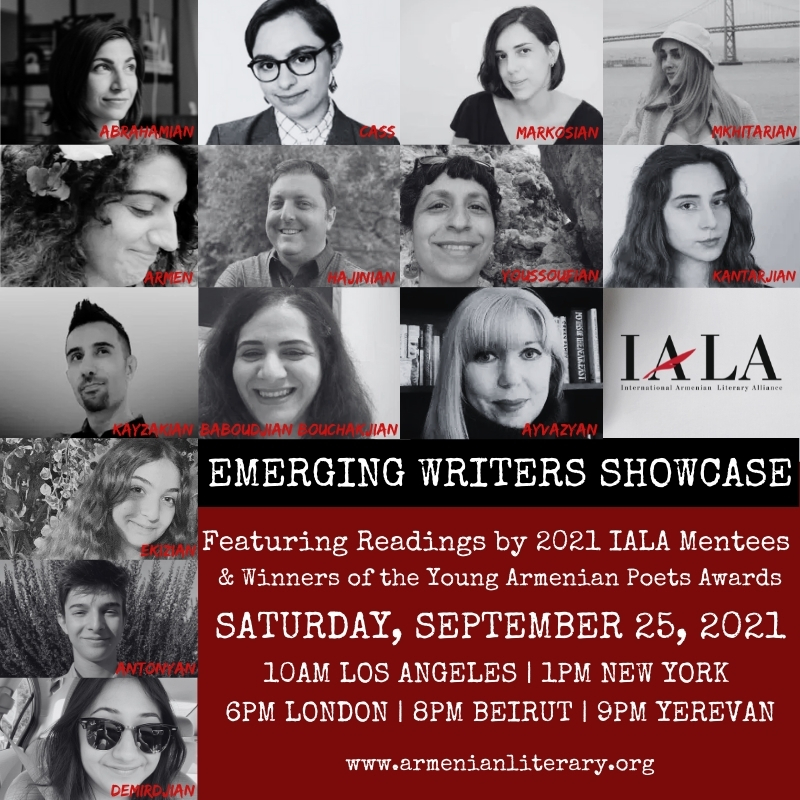IALA x h-pem | Introducing...the 2021 Young Armenian Poets Awards
March 19, 2021 - September 23, 2021
At h-pem we are thrilled to finally share the results of IALA’s (International Armenian Literary Alliance) Young Armenian Poets Awards!
Huge congratulations to the following poets (Listed in alphabetical order), whose works have been selected by IALA’s exceptional judges, as the winners and honorable mention for the 2021 poetry contest.
- Sarkis Anthony Antonyan: “I Meet the Gravedigger Burying a Soldier from Artsakh”
- Sofia Demirdjian-Lara: “I See You in the Jacarandas”
- Lucine Ekizian: “Go Light on the Sweetness”
- Natalie Abadjian: “o white” (Honorable mention)
We are proud to host the special publication of your work on our website!
Thanks to IALA’s vision, you can now add a new feather to your creative accomplishments and develop your potential for lasting fulfillment. Through your originality and creativity, you have each made a significant contribution to raising awareness about the undercurrents and connections that join us as Armenians.
“If poetry can reveal the heart of a people, then poetry written by some of the youngest amongst us can present that heart in the most honest and unadulterated way,” writes IALA Advisory Board Member Alan Semerdjian.
Enjoy Semerdjian’s unique window into the world seen through the eyes of IALA’s young contestants, then check out their winning entries by following the links at the bottom.
We hope our IALA x h-pem collaboration inspires readers to appreciate and care for fledgling poets — they invite us all to reconnect with the parameters of identity and belonging that sustain and surround us, each in their own personal and thoughtful approach.
What better way to understand the heart of a people than to read its poetry? “Language at its most distilled and most powerful,” as defined by former U.S. poet laureate Rita Dove, poetry can function as the window into what makes us who we are and become the conduit to a nation and, in certain cases, its diaspora’s soul. Although Dove’s deft handling of the human condition is what makes her work (and perhaps all poetry) so memorable, the illumination of the black experience in America is also there. How can it not be? While it’s true that we must shy away from easy monolithic renderings of people, it’s also true that so many intergenerational experiences, traditions, histories, etc. come together to form a shared cultural heritage and identity. With this in mind, we turn to Rumi to gain access to Sufi mysticism and Persian ethos. Joy Harjo carries inside her work the prayers and rhythms of the Muscogee Nation, Naomi Shihab Nye the Palestinian gaze, Vijay Seshadri an Indian sensibility, and so forth. Even Jakarta-born Li-Young Lee came from Chinese parents who gifted him an unmistakable repose and grace.
If poetry can reveal the heart of a people, then poetry written by some of the youngest amongst us can present that heart in the most honest and unadulterated way. This is, in part, what we hoped we might find earlier this year when we put out a global call for submissions from Armenian writers aged 14-18. We wanted to honor their urge to create and present their vision, and to identify those who might have the potential to shape something poignant and meaningful with that urge. We were looking for young people who would help us understand our best selves, in a way, and hold up the mirror. Thus, the first International Armenian Literary Alliance Young Armenian Poets Awards was born.
 IALA Presents the Emerging Writers Showcase. To access their virtual reading, click here on September 25.
IALA Presents the Emerging Writers Showcase. To access their virtual reading, click here on September 25.I want to say now and here that the circumstances regarding the pandemic and the Forty-Four Day War and everything else that’s happening in the world must have made entering this type of contest an arduous task to begin with. Although many of us have dived inwards over the last year and a half, we’ve found ourselves more pulled apart than ever, it seems, as every responsibility seems to vie for space in our busy lives. With this in mind, let me say thank you to all who submitted, without whom there is no process or result. We put the call out and you responded. You are the reason we are here.
In addition, I would like to thank those of us who went to great lengths to get the call for work in the hands of our young writers. Our teachers, parents, extended family members, neighbors, and friends. You deserve to be seen too as getting the word out is often the most integral step in the success of this kind of operation.
And to our exceptional judges, I would like to extend massive gratitude. You brought invaluable experience, compassion, and collegiality to the selection process. The conversations about the submissions, which were read without accompanying personal and/or biographical information, were always about craft and content and writerly choices and the manner in which the poem attempted to make meaning in and of the world. I want to say that the poems you’ve selected serve as proof of the power of the next generation’s writing. The poetry of our youth can be an agent of influence to promote social change, combat silence in the face of injustice, and promote the pursuit of beauty understood through the embrace of complex ideas. These exceptional poems that were selected—and, in truth, a few others that weren’t—are all the evidence that we need.
And finally, thank you to h-pem for making space in its pages to honor these young voices. An authentic audience is the critical last step of the writing process and often gives us the fuel to work through it. If all writing is conversation, you provide the telecommunications. We are birds on your wires.
What I, personally, found most compelling about the work we received was the implementation not of invention and imagination,though these were absolutely present in sometimes deeply moving ways. It was not the application of learnedness and craft—attention to line breaks, rhythm, imagistic resonance, and that sort of thing—which also impressed us. Rather, it was the spirit in the works, which manifested in this undeniable need to be heard.
In Letters to a Young Poet, Rainer Maria Rilke asks us this important question: “In the deepest hour of the night, confess to yourself that you would die if you were forbidden to write. And look deep into your heart where it spreads its roots, the answer, and ask yourself, must I write?” The answer for these young writers is yes. Again and again, yes. And lucky for us that this is so...and the world too.
From across the globe these submissions came (Beirut, Toronto, Yerevan, Pasadena, and so many more) and the thing that seemed to tie them all together was voice. Was it that aforementioned one Armenian voice? In one sense, yes; this was most certainly the case. There was the almost meditative penchant for longing and deconstructing challenging experiences (of which the recognition and understanding seem to be quintessentially Armenian) prevalent throughout the works. But in terms of subject matter, there was quite a range. Perhaps one can view it as a multiplicity of voices living in a kind of emotional harmony. A multiplicity of voices functioning as a small and disparate nation with the need to be heard and, yes, truly recognized as the unifying quality.
There is much more to be said about what these young voices can do, but I hesitate to say it. Listening, for me, reaped many rewards, as I imagine it will for you as you spend a few quiet moments inside these brave works that impressed us so. I’m proud and grateful to be able to present them to you here. We’re in good hands.
Check out the winning entries below.
-
Sarkis Anthony Antonyan: “I Meet the Gravedigger Burying a Soldier from Artsakh”
-
Sofia Demirdjian-Lara: “I See You in the Jacarandas”
-
Lucine Ekizian: “Go Light on the Sweetness”
-
Natalie Abadjian: “o White” (Honorable mention)
You can also check out Alan Semerdjian's profile on h-pem here.
Join IALA for their first-of-its-kind virtual reading to highlight the works of emerging Armenian writers on September 25, 2021, at 10 am Pacific / 1 pm Eastern / 9 pm Yerevan time.
The event will feature readings by the winners of IALA’s 2021 Young Armenian Poets Awards.
Any additional references or recommendations? We would love to hear your suggestions!

Join our community and receive regular updates!
Join now!





Shahe Mankerian
26 Sep, 2021 05:12:32 Edited
We're in good hands.
0
Reply